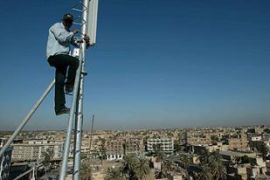Iraq awards mobile phone licences
Mobile sector is one of the few to actually benefit from the country’s instability.

Thriving sector
Iraqi mobile subscriptions were virtually non-existent three years ago but surged to five million by the end of 2006, out of a total population of 26 million people.
The country’s fixed-line network was hit by sanctions after Iraq’s invasion of Kuwait in 1990 and barely survived bombing during the US-led invasion of 2003.
Dearbhla McHenry, a Boston-based Middle East analyst from Pyramid Research, said the mobile phone industry is one of the few sectors that actually seems to be benefiting from Iraq’s instability and crumbling infrastructure.
“Iraq’s comparatively fast-growing mobile penetration rate is explained partly by the poor quality of the fixed network,” McHenry said. “And partly by the very lack of security, which makes investing in Iraq so risky”.
Kuwait’s Mobile Telecommunications, the third-largest Arab telecom company by market value, has already been operating MTC Atheer in Iraq on a short-term licence and had said it was seeking a long-term permit.
Qatar Telecommunications owns 40 per cent of Asiacell through the Kuwait-based subsidiary National Mobile Telecommunications which it took over in March.
Iraq’s Korek Telecom operates in the country’s northern Kurdish regions.
Ali al-Dabagh, an Iraqi government spokesman, said: “Iraqi citizens may possess as much as 45 per cent of the three companies’ shares, and the Iraqi government would receive 18 per cent of the companies’ annual profits”.